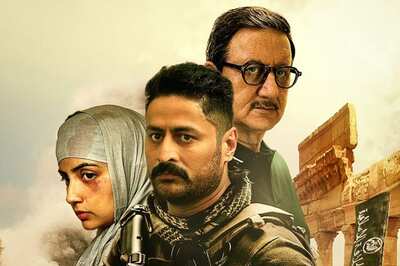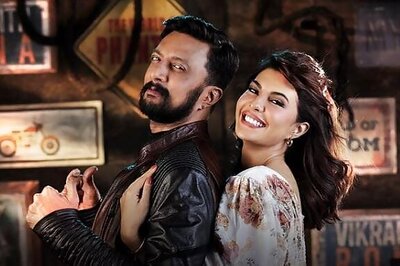
views
New Delhi: He belonged to the trio that was collectively known as Top 3 – the other two being Raj Kapoor and Dilip Kumar. Each had their own brand value and distinct persona. Raj was the tragic tramp and Dilip was the intensely reticent romantic. Dev was the dark hero.
In most of the roles played by Dev throughout 1950s and 1960s his screen characters had his charm, his style, his urban disposition, his gait which created a perception of his screen image with dark shades. As Lord Meghnad Desai puts it in his book 'Nehru's Hero Dilip Kumar', "Dev Anand was the young urbane man straddling the boundary between the police and the criminal".
True some of these were for livelihood. The country, in its early 1950s was confronted very quickly by the reality that political Freedom came with the freebie of a bankrupt economy. Bombay enticed the small town youth in droves to the Big City search of employment – the bang for the buck was decidedly high. The ever luminous street bulb at night was a testimony to a city that sleeps very little. And takes turns in sleeping.
This cramping represented the dark underbelly of the city into which the unemployed youth had been pushed into as the purported promised land. Films like Kala Bazar (1960) or House No. 44 (1955) were examples of this genre. For Raghu (in Kala Bazaar), selling movie tickets in black was to earn a living after he loses his job as a bus conductor, for telling a passenger firmly to get off a crowded bus.
Out of job, a younger sister, brother and widowed mother to support to home, Raghu's mind lurches in the vortex of the Bombay city at all that he sees and hears around him. The beggar asking for a paisa, the shoeshine boy living for a nickel, the rich man with a wad of (almost A4 size) banknotes, the black marketer selling cinema tickets for a premium.... the city could survive without oxygen but not without money, it seemed. The background huffing 'Paisa, paisa, paisa babu paisa, paisa babu paisa.....' pierces his ears.
In House No. 44 Ashok (Dev) belonged to the homeless who sleep inside pipes amidst pelting rain. He discarded this existence as unacceptable and graduates to petty theft.
But Dev also portrayed other shades of anti-heroism that were non-economic in nature. In Baat Ek Raat Ki (1961), when Neela (Waheeda Rehman) admits to being in love with Ranjan (Chandashekhar) the mask of the learned advocate Rajeshwar (Dev Anand) drops momentarily to reveal green jealousy. Bambai ka Babu (1960) carried an incest angle with the hero (Babu) falling in love with a girl who mistakenly believes that he is her brother.
Babu, the thief is also seen as retaliating by turning against his gang – only to land in the clutches of another blackmailer. In Banarasi Babu (1973), Dev plays a part negative role as an imposter.
What also strengthened Dev’s anti-hero image was his ease with more than one woman with no perceivable qualms (unlike the other conscientiously-one-lady heroes).
In Jewel Thief (1967), it was a James Bond-like Vinay (played by Dev) indulging in a right-up-to-the-edge flirting with Anjali (Tanuja) and a one-night stand with Helen (Helen)– albeit for business reasons. In Teen Deviyan it was Dev Anand romancing three women. There were no business compulsions here. It was a young man exercising the consumer's right of choice. In Asli Naqli Anand alias the playboy Prince lies about his true identity. In Joshila (1974), Amar (Dev) hesitates for a moment before agreeing to get enticed by his wealthy employer's sexy wife (played by Bindu). In fact he managed to sneak in there as an employee in the first place not as himself but as an imposter, masquerading to be Madanlal Dogra.
In his magnum opus Guide, Raju (Dev) had a smooth tongue and wore a cocky small town boy demeanour. He was culturally comfortable with the multiplicity of languages around him, could impress his customers with his confident (if impure) understanding of the edifices of Udaipur. His presence of mind was his getaway vehicle from uncomfortable conversations that threatened to corner him. Rosie's (Waheeda Rehman) career as a dancer takes off thanks to a fortuitous break through, glibly stage managed by Raju. Money brings comfort for both of them. Fame brought in happiness.
And along comes the concomitant high-life expense lines of drinking and gambling for a Nuevo rich Raju. His life has jerked forward awkwardly throwing him off balance. Rosie remains a sincere student of her art while Raju is already in a celebratory stupor. Always prone to crossing the grey area, Raju's immature fear of losing Rosie finally entraps him into committing a federal offence of forging Rosie's signature.
In Jaal (1952), it was Tony Fernandez (Dev) with a shady past of having coveted another woman and having betrayed her.
He could charm any woman out of her hutment to the balmy beachside on a moonlit night at almost will.
While Raj would weep and Dilip would brood, Dev would hit back – leaving the post-mortem of the means employed for someone else to do. Raj was always seemingly in tramp clothes and Dilip alternated between sherwani and finely cut suits and spotless white shirts. Dev looked tailor made for a Holmesian cap, hand dug deep into the trouser pockets, open necked shirts, cravat, scarves, jeans (depicted arguably for the first time in Hindi cinema in Prem Pujari) and the staccato drags of the cigarette. Raj and Dilip looked comfortable by the beachside with their heroines. Dev was equally at home in a bar – ideally with a pretty girl singing; as in Baazi (1951).
Dev had the delicate aroma of forbidden scents, the slanting walk, the toothless smile with a cocked head. He was angular but not crooked. He was not a rogue. He was merely the delinquent charmer. Even in jail he could win the heroine's heart with a soulful melody Kiska Rasta Dekhey (in Joshila).
These were akin to a campus star boy being able to pull just about anything off. Even if he did not, his failure was hard to ignore. These roles personified the sheer self confidence of Dev Anand as a person – not just the characters he played.
If there was any one actor who was the quintessential anti-hero of the pre 1970s, it was Dev Anand.
(Anirudha Bhattacharjee and Balaji Vittal are co-authors of the best-selling book 'RD Burman: The Man The Music' by Harper Collins)




















Comments
0 comment